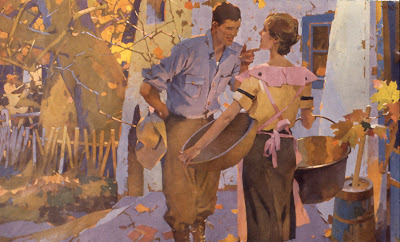Walter Everett- couple on hillside (unfinished?)
Last week I got an email from artist Kevin Ferrara regarding a previous post I did on the work of Golden Age Illustrator Walter Everett (1880-1946).
As a result, we happily traded Walter Everett scans which were new to both of us. This exchange motivated me to have another look at Everett's work and I came away with a renewed appreciation of his skill. I continue to be especially impressed by his design sense, bold brushwork and color use.
Washer Woman- finished painting
Sketch for the above painting- notice design differences from finish
A student of Howard Pyle, during the first quarter of the 20th century, Everett established himself as one of the most sought after illustrators. He founded the program at the Philadelphia College of Art (formerly the School of Industrial Arts) in1911 where he taught until the conformity of academia chafed too much. He abandoned teaching in 1915.
His ego and tendency to push deadlines to the last possible moment or beyond, made him an art director's nightmare. But Everett's brilliant work made him a headache that publishers were obviously willing to tolerate as his work continued to appear in all the major publications of the day.
At the height of his career in the mid 1930's, Everett famously burned the bulk of his life's work to ash according to several accounts including this post on David Apatoff"s Illustration Art blog. He then disappeared from illustration forever. nobody seems to know why.
Walter Everett spent the rest of his life creating personal work such as the one below which was on his easel at the time of his death in 1946
Very little remains by way of Everett's original art and tear sheets of his printed work. I would love to find more examples, but for now I'll be satisfied with digesting the samples I have. If you have any scans of Everett's work that may be more obscure and that you are willing to share, I would appreciate it.
Walter Everett was one of the most talented of the Golden Age of Illustration, giving nothing to the likes of Dean Cornwell, N.C. Wyeth, Harvey Dunn. He was certainly one of the very best from an era of illustration giants.



















